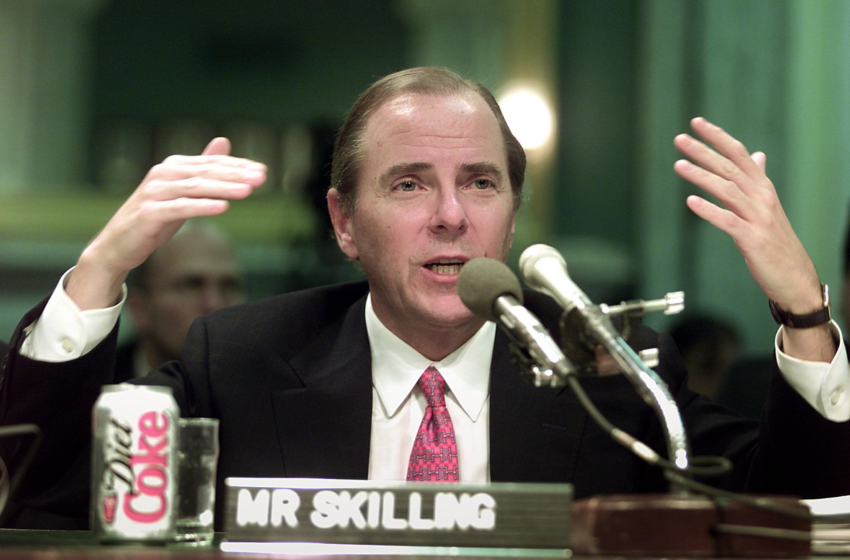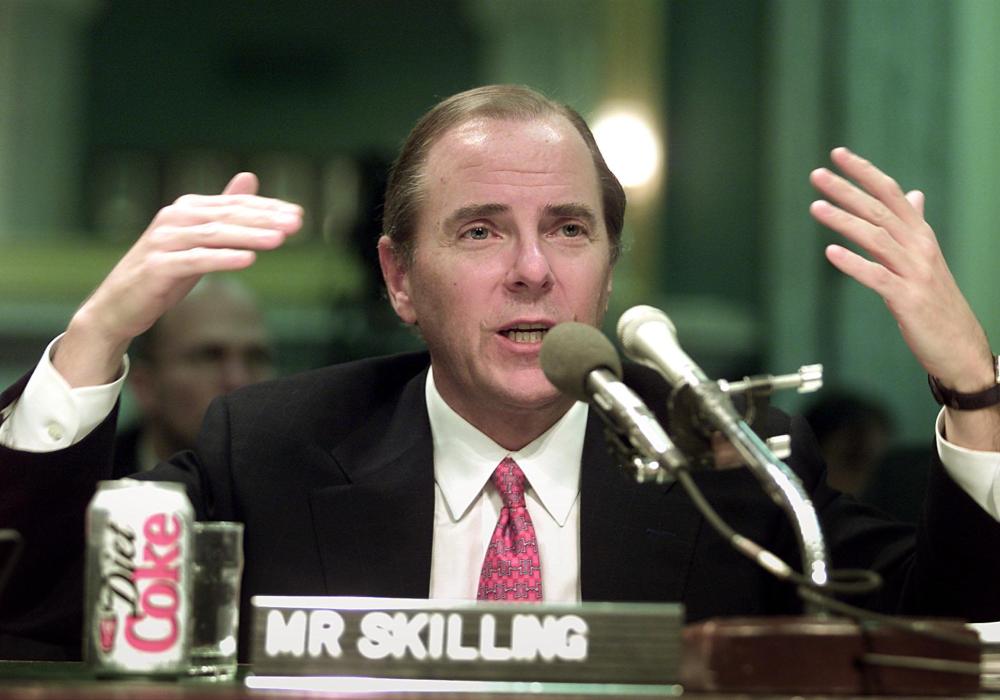The sudden collapse of Enron, culminating in what was then the largest bankruptcy filing in U.S. history on Dec. 2, 2001, changed thousands of lives, damaged investor confidence to the core and made household names out of previously obscure businesspeople.
Many were dragged in front of congressional committees and berated in seemingly endless hearings. Some were later indicted, arrested and paraded in front of cameras in handcuffs as part of a national catharsis. Twenty years later, the last of the Enron defendants have completed their prison sentences, paid their restitution and have sought to move on with their lives.
Even now, few of the dozen or so people we spoke to for this article were willing to speak publicly about their time at Enron. Several said they saw “no upside” in re-associating themselves with the company, preferring instead to keep a low profile. More than one said that even two decades later, recounting the experience is deeply emotional. One former executive said he would need time to “decompress” after an hour-and-20-minute phone conversation about Enron — most conversations with Enron alumni are long.
All the former company leaders CNBC spoke with still recall their time at Enron fondly, as do many of the thousands of employees who may still blame them for the collapse of what all seem to agree was a special place to work.
Kenny Boy
Former Enron chairman Kenneth Lay (C) leaves the Bob Casey U.S. Courthouse after the day’s proceedings in his fraud and conspiracy trial, April 26, 2006, in Houston, Texas.
Dave Einsel | Getty Images
Enron’s founder and chairman, Kenneth Lay, did not survive the scandal. Not long before Enron’s collapse, he was riding high — a local hero in Houston who had been rumored to be in line for a post in the new George W. Bush administration. Lay had deep ties to the Bush family, nicknamed by the second President Bush as “Kenny Boy.”
Convicted on 10 felony counts in 2006 — a verdict that he said at the time left him “shocked” — Lay died of a heart attack six weeks later while awaiting sentencing. Because he never had the chance to appeal the verdict, his convictions were vacated by the court.
Lay’s daughter Elizabeth, an attorney who worked on his defense team, and son Mark, a former Enron vice president who still works in the energy industry, recalled what they said were multiple firsts at Enron under their father’s leadership, in areas including renewable energy, environmental stewardship, and support for minorities and disadvantaged people.
“The model was simple, hire the smartest people you could find, give them capital and manage the back office for them so they could build new markets,” they said in a statement to CNBC.
Smartest guys
Former Enron CEO Jeffrey Skilling testifies before the Senate Committee on Commerce, Science and Transportation February 26, 2002 on Capitol Hill in Washington, DC.
Stephen Jaffe | AFP | Getty Images
Former CEO Jeffrey Skilling, the one-time McKinsey consultant who developed Enron’s “asset-light” business model focusing on market-making businesses like natural gas trading instead of traditional pipelines, completed a 12-year prison term in 2019. His sudden resignation after just six months as CEO in 2001 triggered some of the first suspicions about problems at Enron.
Skilling, who declined to comment for this story, served the longest sentence of any Enron defendant, convicted alongside Lay on 19 counts including fraud, conspiracy and insider trading. He has consistently maintained his innocence, but he dropped his remaining appeals in 2013 as part of an agreement with the Justice Department that led to his early release from prison.
He was originally sentenced to 24 years, but a federal appeals court ruled the sentence was excessive and sent the case back to the trial judge for resentencing. In 2013, Skilling and the DOJ agreed to jointly recommend a 14-year sentence in exchange for Skilling dropping his remaining appeals. With good behavior, that meant Skilling was released after approximately 12 years.
Today, Skilling is back in Houston, where he is working on a start-up firm in the energy industry, Veld Applied Analytics. According to its website, the company is developing “sophisticated analytical tools to establish and monitor valuation” of oil and natural gas assets.
Richard Causey, the former chief accounting officer who was slated to go on trial alongside Skilling and Lay but agreed to plead guilty just weeks before the trial began, served nearly five years in prison and was released in 2011. Today, he too is back in Houston, where he operates a niche financial consulting business. Causey also declined to comment.
Ethics needs to be taught like a skill that’s like accounting, where you’re really going through all the different dilemmas that might cross your desk.
Sherron Watkins
Former Enron vice president
One of the few former Enron executives willing to discuss their experiences is Andy Fastow, former chief financial officer. Fastow, who created some of Enron’s most notorious off-balance-sheet transactions and made millions in the process, eventually pleaded guilty to two fraud counts. He was a star prosecution witness against Skilling and Lay, and served five years in prison.
He too declined to be interviewed, but he provided a statement on the 20-year anniversary of Enron’s bankruptcy.
“I believe that what I did was wrong, was unethical, and was illegal. I take full responsibility for my actions. I am ashamed and embarrassed every day of my life. To those who were hurt by my actions, directly or indirectly, I apologize. I don’t expect you to accept my apology, but you deserve to hear it,” he wrote.
Former Enron chief financial officer Andy Fastow is escorted from the Bob Casey Federal Courthouse in Houston, Texas by U. S. Marshals after his fourth day of testimony for the government in the fraud and conspiracy trial against Jeff Skilling and Ken Lay Monday, March 13, 2006.
F. Carter Smith | Bloomberg | Getty Images
Since his release from prison in 2011, Fastow has worked the lecture circuit, and has also given unpaid talks to business groups, fraud investigators and college classes. Often, he displays his Federal Bureau of Prisons identification card in one hand and a “CFO of the Year” trophy he once won in the other. His message: even though companies and executives may believe they are following the rules, they could still be breaking the law like he did. Fastow says misleading deals like the ones he did at Enron are still common in business, and still celebrated.
“You can follow all the rules, and yet still be committing fraud. That should make everyone very uncomfortable,” Fastow said in an excerpt from one of his speeches posted online by the BigSpeak Speakers Bureau, where the going rate for a Fastow speech is listed at $10,001-$20,000.
Blowing the whistle
Enron’s Vice President of corporate development Sherron Watkins (L) watches as former President and CEO of Enron Corporation Jeffrey Skilling (R) testifies before the Senate Committee on Commerce Science and Transportation February 26, 2002 in Washington, DC.
Mark Wilson | Getty Images
Another former Enron executive who has parlayed her experience into a speaking and consulting career said that from what she has seen, Fastow still doesn’t get it.
“The CFO of the Year award is the same information as investors and employees, while the Department of Justice has subpoena power and could get to the root of the transaction, so that’s a misrepresentation,” said former Enron Vice President Sherron Watkins in an interview. “I am conflicted about his message because he is talking about principles over specific rules. It gives a good message, but he acts like he was a victim of the ambiguity and the accounting rules when in fact he looks for the ambiguity in the rules to force a result that he wants.”
Watkins, who at one time reported to Fastow, brought her concerns about Enron’s accounting to Lay soon after Skilling’s resignation. When her memo to Lay became public during the congressional investigation, she gained fame as the “Enron whistleblower.”
After testifying before Congress and in the trial of Skilling and Lay in 2006, Watkins became a speaker and a corporate consultant, although she said the consulting work never really took off.
“I think companies are fine hearing my story, one-way communication. I’ve never been hired for two-way communication,” she said. “For whatever reason, I make them uncomfortable.”
Today, she still gives speeches, and she teaches, serving as executive in residence at Texas State University.
“Ethics needs to be taught like a skill that’s like accounting, where you’re really going through all the different dilemmas that might cross your desk,” she said.
While Watkins is typically billed as a whistleblower, she never took her concerns outside the company. She said that is because there was not much of a mechanism for employees to do so in 2001. She takes pride in the fact that there are now protections for corporate whistleblowers, including the Securities and Exchange Commission’s robust Office of the Whistleblower created following the 2008 financial crisis.
“They’ve already given out over a billion dollars of rewards in the 10 years it’s been operating,” she said.
The enforcers
U.S. Assistant Attorney and Enron Lead Prosecutor Leslie R. Caldwell speaks with the media October 16, 2002 in Houston, Texas.
George Wong | Getty Images News | Getty Images
While the most prominent Enron executives have kept a low profile over the past 20 years, some members of the government team that investigated the collapse saw their own careers skyrocket.
Soon after Enron’s collapse, amid public outrage, and a determination that the U.S. attorney’s office in Houston had too many Enron-related conflicts of interest (as did then-Attorney General John Ashcroft, who recused himself from the investigation), the George W. Bush administration formed an Enron Task Force to investigate the company.
The first director of the task force was Leslie Caldwell, who had cut her teeth prosecuting organized crime in Brooklyn, New York, and brought many of the same tactics to the Enron investigation.
Caldwell, who obtained the indictments of Fastow and Skilling, and secured the pivotal guilty plea from Fastow, would go on to head the Justice Department’s criminal division in the Obama administration. Today, she heads the white-collar defense practice as a partner at Latham & Watkins in San Francisco.
In an interview, Caldwell said she is proud of the task force’s work, which she said has helped make a lasting impact on corporate accountability.
“It led to a change in culture at a lot of companies around the country. Compliance, which used to be kind of a back-office function that nobody really paid attention to, became huge,” she said. “I also think it’s sent a very strong message about corruption in leadership ranks and how that’s really something to be avoided at all costs.”
Her successor as Enron Task Force director, Andrew Weissmann, would go on to become a top prosecutor in former FBI Director Robert Mueller’s investigation of Russian interference in the 2016 election. Today, he is on the faculty at New York University, and is a legal analyst for NBC News.
Weissmann was followed as director by Sean Berkowitz, who was the lead prosecutor in the Skilling and Lay trial. Now the global chair of the complex commercial litigation practice at Latham & Watkins in Chicago, he has represented high-profile white-collar defendants including “Full House” actress Lori Loughlin in the Operation Varsity Blues college admission scandal.
A deputy director of the task force, Kathryn Ruemmler, would go on to become White House counsel in the Obama administration. Today, she is general counsel at Goldman Sachs.
Disclosure: Comcast is the parent company of both NBC News and CNBC.










